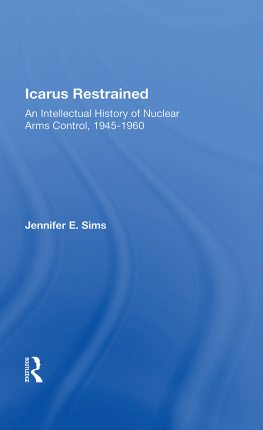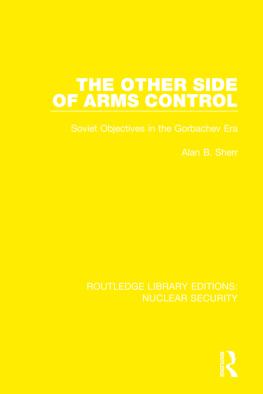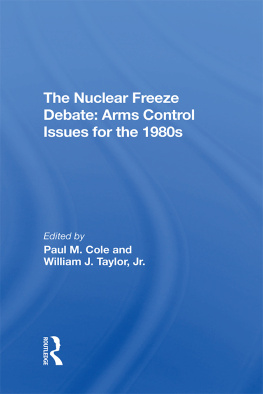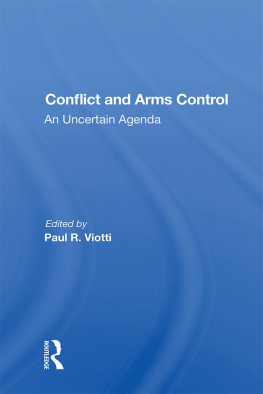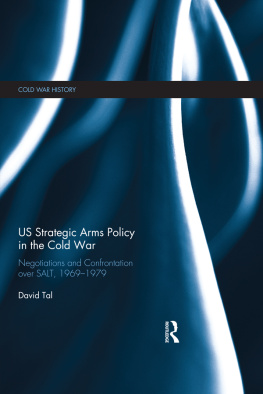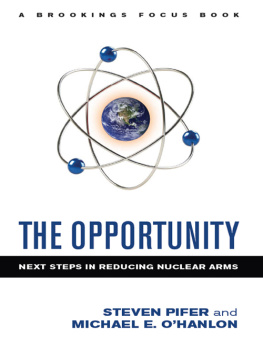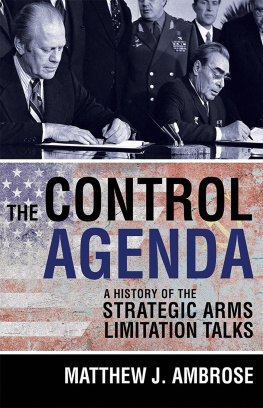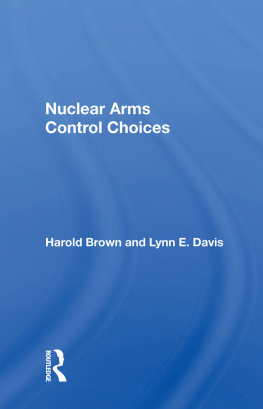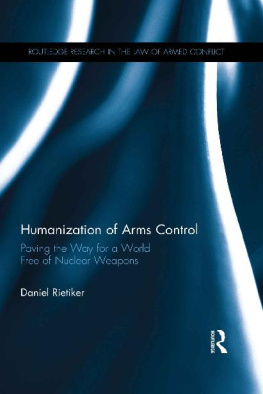First published 1990 by Westview Press
Published 2018 by Routledge
52 Vanderbilt Avenue, New York, NY 10017
2 Park Square, Milton Park, Abingdon, Oxon OX14 4RN
Routledge is an imprint of the Taylor & Francis Group, an informa business
Copyright 1990 by Taylor & Francis
All rights reserved. No part of this book may be reprinted or reproduced or utilised in any form or by any electronic, mechanical, or other means, now known or hereafter invented, including photocopying and recording, or in any information storage or retrieval system, without permission in writing from the publishers.
Notice:
Product or corporate names may be trademarks or registered trademarks, and are used only for identification and explanation without intent to infringe.
Library of Congress Cataloging-in-Publication Data
Sims, Jennifer E.
Icarus restrained : an intellectual history of nuclear arms
control, 19451960 / Jennifer E. Sims.
p. cm.(Studies in global security)
Includes bibliographical references (p.) and index.
ISBN 0-8133-7750-1
1. Nuclear arms controlUnited StatesHistory. I. Title.
II. Series.
JX1974.7.S4767 1990
327.1740973dc20
90-13041
CIP
ISBN 13: 978-0-367-01323-3(hbk)
To my parents, Ruth and Albert G. Sims
I was first inspired to write an intellectual history of arms control during my graduate studies at the Johns Hopkins School of Advanced International Studies (SAIS). Listening to the SALT ratification debates, studying the evolution of national security policy, and holding an internship at the U.S. Arms Control and Disarmament Agency inspired an interest in understanding the origins of the postwar arms control community and its set of shared beliefs.
The original manuscript was mostly researched and written between 1979 and 1985 as a doctoral dissertation for The Johns Hopkins School of Advanced International Studies. Partial financial support for the dissertation came from a Hubert H. Humphrey Arms Control and Disarmament fellowship administered by the United States Arms Control and Disarmament Agency.
I will be forever grateful for the guidance, encouragement, and insights offered by my thesis adviser, Dr. Robert Osgood. I have missed him. Among others who have read the manuscript in whole or in part and have taken the time to provide helpful comments and criticisms are Robert L. Gallucci, Robert W. Tucker, David Alan Rosenberg, David Calleo, Charles Doran, James Rosenau, G. Allen Greb, Lawrence Freedman, George Quester, Uwe Nerlich, and Ruth and Albert Sims.
Among those who patiently listened to my evolving ideas on the subject, I especially wish to mention William T.R. Fox, Lawrence Weiler, Richard Burt, Lewis Dunn, Catherine Kelleher, Marc Trachtenberg, Donald Brennan, Charles Van Doran, Charles Henkin, Lucas Fischer, Ned Sabrosky, Ivo Daalder, and Milton Leitenberg.
I owe an intellectual debt of enormous magnitude to Professor Craig MacLean (formerly of Oberlin College). Most scholars have at least one teacher who challenged them to be more than they ever thought they could be; I was fortunate to have one who also took the time to show me how. He taught me to think analytically and. more importantly, how to persevere. Someday I hope to be able to meet his standards and at least in some measure to follow his example.
A manuscript cannot become a dissertation or a book without a great deal of editing and line-in/line-out advice. For his patience with detail as well as substantive advice I would like to thank David Rodgers, without whom this book would never have gone to press. Others who contributed time and energy to production of the final version include Christopher Weuve, Sean McCormack and Derek Freda. The original manuscript was produced by Elizabeth Izawa in Rome, Italy. Her excellent secretarial skills were critical to the preparation of the dissertation.
My husband, Bob Gallucci, never doubted me. My two children, Jessica and Nicholas, never let me lose perspective. For their years of patience and encouragement, mere thanks would never be enough.
Of course I take full responsibility for the final product.
Jennifer E. Sims
College Park, MD
Part One
Delimiting the Approach
If one behaves in a particular way, in anticipation of the others reciprocation, there is a need to make clear precisely how one is behaving, with what mutual purpose in mind (I)/the idea behind what we think we are doing is not perceived by our partner (enemy), what we expect of him may be too dimly perceived to be the basis for genuine reciprocation.
Thomas C. Schelling
Reciprocal Measures for Arms Stabilization, in Brennan, Arms Control , 178.
(T)he very fact that we transmit such concepts to the Soviets serves to indicate that, in our estimation, the differences between us do not necessarily imply the issue of social extinction. Such an attitude may, in the long run, reduce the likelihood of any large-scale military conflict between us.
Thomas C. Schelling
The State of the Arms Race, in Dougherty and Lehman, eds., The Prospects for Arms Control , 55.
1
Introduction
Ideas on how to achieve security have greater impact on this society than does any other set of ideas. More of our public money is spent on them than on any other area of national life. The peace of mind of our people depends on them. Yet we do not examine where we get the ideas, nor, after almost forty years, do we stop to test them.
This commentary by a well-known defense policy critic has a special truth today as the nation struggles with its nuclear policies. From weapons procurement decisions to arms control policy, controversy and confusion over our nuclear premises and objectives are manifest. Logic would suggest that history, in its most intimate, intellectual form, could give us insight into the origins of our ideas and myths about nuclear weapons. Especially in the field of nuclear arms control, which is wrapped in a thick cloak of rhetoric and political grand-standing, intellectual history can help us understand the fiber, weave and texture of our current thinking.
However the notion of writing about the intellectual history of nuclear arms control is frequently met with boredom, skepticism or astonishment even by those who have been engaged in the process of developing policies in the area. Such reactions are at first startling and then sobering: How is it that in matters of such importance many of those concerned can be unaware of their premises and, more importantly, uncertain of the value of researching the history behind them? The lack of enthusiasm for intellectual history has even extended to academics in the nuclear field, reflecting both a weariness with theorizing about deterrence and a fascination with the data, gradually being released, on the history of weapons arsenals and targeting plans themselves. No longer is it necessary to consider only what we thought or said we would do with nuclear weapons; the facts themselves regarding procurement, deployment and options for the Single Integrated Operations Plan (SIOP) are being disclosed through Freedom of Information Act Requests and routine declassification processes. This flow of information has turned nuclear history into an attractive field for military historians as well as political scientists, persuading many in the field to turn from discussion of shifting paradigms and the evolution of strategic theories to exploration of where precisely weapons were, how many, what kind and why.

